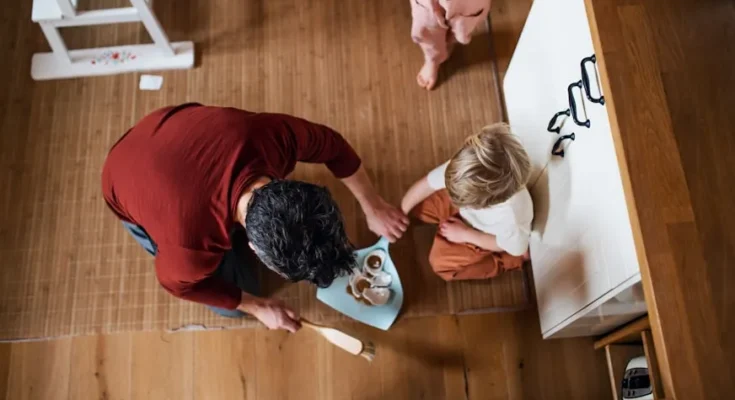The Journey of Parenthood:
Parenting is not simply a role or responsibility. It is a journey of growth, love, and transformation. The day a child enters the world, a parent is born too. No manual or checklist can fully prepare someone for the unpredictable and deeply emotional path that follows. Yet, within the countless moments of laughter, tears, joy, and challenge, lies an opportunity to shape a human life with wisdom and love.
Parenting is not about perfection. It is about intention. It is less about knowing all the answers and more about asking the right questions. It is not about control but connection. The best parenting does not focus only on raising obedient children, but on raising future adults who are resilient, kind, and aware of their purpose in the world.
Building the Foundation of Trust and Love:
- The First Language is Connection
Before a child learns to speak, they learn to feel. The language of touch, tone, and presence becomes the first bridge between parent and child. Holding a baby close, responding to their cries, and making eye contact might seem simple, but these small actions build trust that lasts a lifetime.
A secure attachment formed in the early years influences how a child views themselves and others. It becomes the foundation for confidence, emotional intelligence, and healthy relationships. When children feel safe and loved, they explore the world with courage.
- Unconditional Love
Children should never feel they need to earn their parents’ love. Discipline, correction, and expectations are all necessary parts of parenting, but they must rest on a deep and constant foundation of love. Unconditional love does not mean permissiveness. It means saying, “I love you always, even when you make mistakes, even when we disagree.”
When love becomes the constant background music in a child’s life, they grow with a sense of security that fuels their growth. They feel worthy of care, and that feeling helps them care for others.
The Art of Listening and Speaking:
- Hear the Unspoken
Children do not always say what they feel in words. Sometimes they act out. Sometimes they withdraw. Sometimes they test boundaries—not out of defiance, but confusion or unmet needs, a phenomenon defined in research on attachment theory and parenting styles—first categorized by psychologist Diana Baumrind on Wikipedia’s Parenting Styles page, which explains how responsive and demanding styles affect child behavior. The job of a parent is not just to react but to listen between the lines. What is my child trying to say with this behavior? What are they really feeling?
Being a good listener means putting away the phone, turning off the TV, and giving your child full attention. It means not rushing to solve their problems, but letting them know you are with them. That presence speaks louder than advice ever could.
- Speak with Kindness and Clarity
Words shape a child’s inner world. Harsh words can linger for years, while kind, affirming ones can build a sense of worth that lasts a lifetime. Speak to your children with respect, even when correcting them. Be honest, but gentle. Be clear, but loving.
Children mimic how their parents communicate. The tone you use with them becomes the voice they use with themselves. If your words are patient and supportive, they will likely grow to speak to themselves and others in the same way.
Discipline with Wisdom and Empathy:
- Boundaries Create Safety
Discipline is not punishment. It is teaching. Children need boundaries to feel secure. They need to understand what is acceptable and what is not. But these rules should not come from fear or control. They should come from care and consistency.
Set limits that make sense, explain them, and stick to them calmly. When rules are predictable and fair, children learn responsibility and self-regulation. They understand that choices have consequences, and this prepares them for life beyond the home.
- Mistakes Are Part of Growth
Every child will make mistakes. That is how they learn. The role of a parent is not to prevent every misstep, but to guide the child through it. When a child fails or misbehaves, approach the moment not with shame, but with curiosity. What led to this? What can be learned from it?
Help your child reflect and grow. Teach them that mistakes do not make them bad. They make them human. And humans can learn, change, and do better tomorrow.
Fostering Independence and Confidence:
- Letting Them Try
One of the hardest parts of parenting is stepping back. It is tempting to do everything for your child, to protect them from failure or disappointment. But children grow through doing. Let them try. Let them struggle a little. Let them experience natural consequences.
Encourage problem-solving. Celebrate effort more than results. When children accomplish something on their own, even if it is imperfect, they gain real confidence. They learn that they are capable, and that belief shapes their identity.
- Encouraging Decision-Making
Offer choices when possible. Whether it is choosing their clothes or deciding what snack to eat, small decisions give children a sense of control. As they grow older, involve them in bigger decisions. Teach them how to weigh options, consider others, and take responsibility.
Decision-making is a skill. The more they practice, the better they become. And the better they become, the more equipped they are to handle life’s challenges with grace.
Parenting with Presence in a Digital World:
- The Power of Being Available
In today’s world, distractions are everywhere. Work follows us home. Screens demand our attention. But children still need us fully present. Set aside time each day where your child has your full attention. Even fifteen minutes of undivided presence can deepen the bond and make a child feel seen.
Being present means more than just being in the same room. It means engaging, listening, playing, and sharing. Studies from the UC Davis Children’s Hospital on positive parenting show that techniques like reflective listening, praise, imitation, and description—the PRIDE skills—help build deeper connection and emotional security in children. These small moments of connection are the ones children remember most.
- Teaching Healthy Tech Habits
Technology is part of modern life, and children will use it. But they should not be left to figure it out alone. Model healthy screen use. Set limits together. Talk about what they watch and play. Teach them that the online world is not separate from real life and that the same values apply.
Help them understand the importance of balance, and make sure tech does not replace real-life interaction, creativity, or physical activity.
Nurturing Values and Beliefs:
- Growing Good Humans
More than achievements, most parents want to raise kind, honest, and thoughtful individuals. These values do not develop through lectures. They grow through example. Show kindness to others. Apologize when you are wrong. Share your beliefs and live them authentically.
Invite conversations about fairness, honesty, generosity, and empathy. Discuss real-life situations. Help your child think about others and the impact of their actions.
- Spirituality and Purpose
Whether through faith, mindfulness, or nature, many families find strength in spirituality. Encourage your child to ask big questions. Offer guidance, but let them explore. A sense of purpose can provide comfort and direction throughout life. It helps children stay grounded in a world that often feels chaotic.
Conclusion:
Parenting is not about having all the answers. It is about being there with love, humility, and a willingness to grow alongside your child. It is about guiding, not controlling. It is about teaching through example and building trust through consistency.
There will be days of doubt and difficulty. There will be moments where everything feels like a mess. But there will also be laughter, learning, and a love that grows deeper with each passing year.
In the end, the most important thing a child can feel is this: I am loved. I am safe. I matter. If you can give them that, you are already doing something extraordinary.




